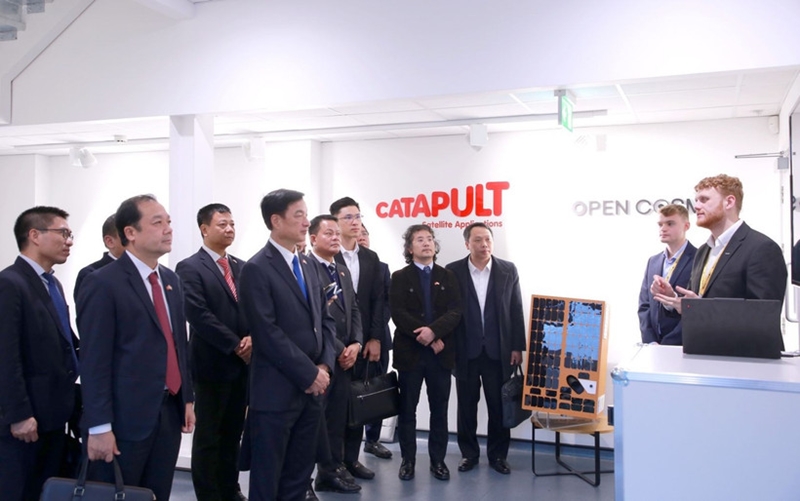The activities formed part of Party General Secretary To Lam’s official visit to the U.K.
At the Catapult Network, the delegation, led by Nguyen Duy Ngoc, Politburo member, Secretary of the Party Central Committee, Chairman of the committee’s Inspection Commission, and Deputy Head of the Central Steering Committee for Science - Technology Development, Innovation and Digital Transformation, explored the “intermediary application organization” model. They also learnt about the sustainable public - private partnership, exemplified by the “one-third funding” structure, in which financing is shared equally among the government, commercial contracts, and collaborative R&D projects. This model enables centers to serve national goals while maintaining operational autonomy and market orientation.
    |
 |
|
The Vietnamese delegation visits Catapult Network in London. |
The delegation also examined the programs promoting the application of advanced digital technologies such as artificial intelligence (AI), 5G, and quantum computing, toured laboratories, and gained insights into successful technology commercialization projects.
The Catapult Network consists of nine technology and innovation centers working independently and not for profit across the U.K. that help bridge the “valley of death” between academic research and industrial application.
At Imperial College London, one of the world’s top institutions in science, technology, engineering, medicine, and business (STEMB), the delegation learnt about the White City Campus, a major innovation district focusing on deep tech. The initiative reflects how universities can play a central role in creating local innovation-driven economies by co-locating research facilities, incubators, and corporate partners to form a self-sustaining ecosystem.
The delegation explored Imperial’s approach to supporting start-ups “from idea to enterprise,” the strategy for developing a university-led innovation district, intellectual property and spin-out policies, and collaboration with investors and local authorities to turn White City Campus into an innovation district.
The Vietnamese delegation also visited Oxford University, where they got to know its comprehensive technology transfer system, including the university’s own venture capital fund, and examined how Oxford fosters a culture of entrepreneurship in academia.
At Harwell Science and Innovation Campus, they explored a public - private partnership model for developing a national science park, the strategy for building specialized technology clusters, mechanisms for sharing and commercializing national research infrastructure, along with how private companies from start-ups to large corporations access and utilize state-owned research infrastructure worth billions of pounds. The visit also provided insights into strategies for facilitating collaboration between research organizations, major enterprises, and small and medium-sized firms.
Coming to the Alan Turing Institute, the U.K.’s national institute for data science and artificial intelligence, the delegation was updated about the institute's cooperation with defense and security communities to provide strategic AI solutions, the projects on AI safety, ethics and governance, and language models for the public sector.
Source: VNA